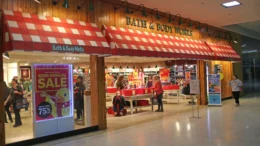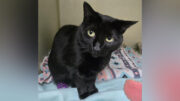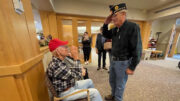
The sun rises behind the Christ the Redeemer statue, above the Guanabara bay in Rio de Janeiro, Brazil, on July 19, 2016, ahead of the 2016 summer Olympics. (AP)
Even the heavens seemed on edge.
In February, physicists announced that they had turned their lasers and mirrors to the cosmos and heard something extraordinary: The sound of two black holes colliding, a smash-up that lasted a fraction of a second and yielded 50 times the energy of all the visible stars.
“We can hear the universe,” one scientist said, and the Earth, not to be outdone, cried back.
There were, let’s not forget, plenty of cheers: When Brazil beat the odds to pull off an Olympics; when Washington premiered a dazzling new black history museum; when Los Angeles finally got a light rail line to its Westside.
But most of the year’s soundtrack seemed written in a minor key.

In this Aug. 14, 2016 file photo, police move in on a group of protesters throwing rocks at them in Milwaukee. In August, a north side Milwaukee neighborhood erupted in violence following the police shooting of a young black man, Sylville Smith. (AP)
Our ears were still ringing from the savage cacophony of assault rifles tearing into a holiday party last year in San Bernardino when bombs exploded in airports in Brussels and Istanbul and screams rose from a beachfront promenade in France.
An Islamist gunman entered a gay nightclub in Orlando, blasting away until 49 were dead, and gunshots continued to echo through our cities — black men shooting one another, cops shooting black men — and as the chant grew stronger, Black Lives Matter, we heard of police shootings in Dallas, Baton Rouge, Palm Springs and Lancaster.
In Britain, the loud and obstreperous campaign to leave the European Union left one lawmaker decrying “ … hate and xenophobia,” after another was stabbed and shot to death.
In America, Rust Belt refugees and disaffected millennials roared with approval as two populists connected with the dissatisfaction of their lives.

Donald Trump and Hillary Clinton shake hands during the presidential debate Sept. 26 at Hofstra University in Hempstead, N.Y. (AP)
Bernie Sanders’ message of a “rigged economy” and “broken criminal justice system” caught fire, but was eventually drowned out as Hillary Clinton made history as the first woman to win a major party’s nomination for president.
At the same time, a reality-television star turned his signature utterance — “You’re fired” — into an even broader, if snarky indictment of America’s political system, channeling a pent-up rage and delivering it from the dais and in a fusillade of early morning tweets.
By late summer, politics had erupted into theater, complete with a cast of Russian hackers, and it played as a distraction, even entertainment for the most cynical and callow. Rally posters became old-fashioned cudgels, each word striking a blow: Hillary for Prison 2016, Make AmeriKKK Mexico Again.
Anyone with an opinion could weaponize a keypad, and hashtags sliced across the web like bullets.
Empowered by Snapchat, Instagram and Twitter, citizen journalists, powerful PR firms, learned pundits, crackpot conspiratorialists and trolls from the right and left wrestled authority from traditional news organizations, whose claim to credibility rested on a commitment to accuracy and fairness and other values that no longer seemed to count for much.
Soon enough misinformation turned into disinformation, and the clamor of fake news grew to a din:
“WikiLeaks CONFIRMS Hillary Sold Weapons to ISIS”
“Trump’s Cabinet Members to be Determined by Apprentice Style Reality Show”

In this Nov. 4, 2016, file photo, a bus carrying Chicago Cubs players, family and friends passes Wrigley Field during a parade honoring the World Series champion baseball team in Chicago. The Cubs’ first World Series title since 1908 is the runaway winner for top sports story of 2016. (AP)
One man, armed with an assault rifle, took it upon himself to investigate a story of a pizza parlor in Washington that supposedly sheltered a child sex ring connected to the Clinton campaign.
As we learned from Guantanamo, living with noise blaring all the time makes clear thinking impossible.
Yet 2016 did have its few sweet notes, and like those physicists listening to sounds from space, we discovered a music that could sustain us. We joined Cubs fans swaying in rhythm and singing in glorious disharmony “Go Cubs Go” after their team won its first World Series in 108 years.
We heard Native Americans at Standing Rock tattooing

In this Dec. 4, 2016 file photo, protesters march at Oceti Sakowin camp where people have gathered to protest the Dakota Access oil pipeline in Cannon Ball, N.D. It has been called the largest gathering of Native American tribes in a century. (AP)
leather-skinned drums to celebrate their success in stopping a $3.7 billion oil pipeline. We paid attention to a mourner at a memorial for the dead in Orlando, who said: “They will not hate us away.”
We listened with tears and smiles and even bewilderment as Beyonce performed “Formation” at the Super Bowl, her dancers dressed as Black Panthers.
We listened as the airwaves filled with version upon version of Leonard Cohen’s haunting “Hallelujah,” and we listened as Patti Smith stood before the king and queen of Sweden to sing Bob Dylan’s ballad of apocalyptic beauty, written at a moment in our history that was equally perilous and loud.
“Oh, where have you been, my blue-eyed son?
And where have you been, my darling young one?”
And even when we poked about between the disharmonious tweets and Facebook posts, we lingered on a few links worth bookmarking and heard sounds that will surely outlive our ephemeral concerns.
Click, for example, on a YouTube video recorded in a Seattle backyard where a retired aerospace engineer, Paul Gregg, has built three roller coasters for his grandchildren.
As raucous as 2016 was, the peals of their laughter are a melodic antidote to the year’s unsettling howl.
– By Thomas Curwen, Los Angeles Times (TNS)





































